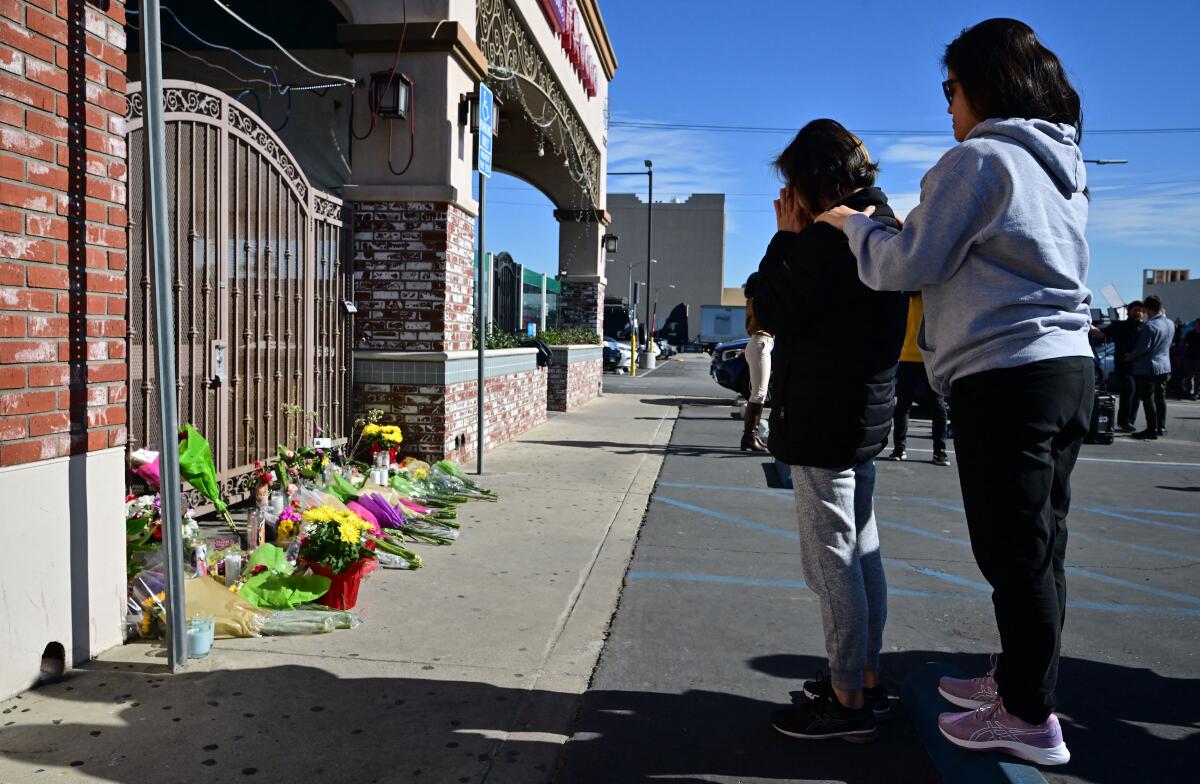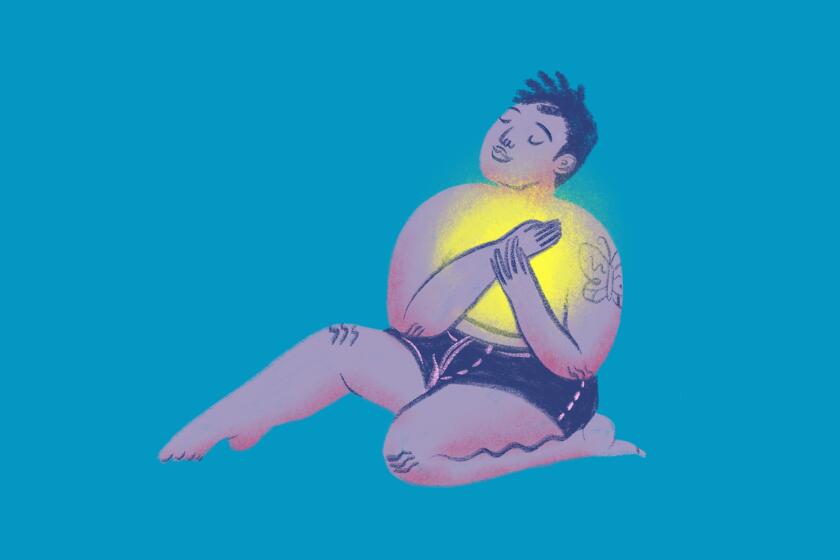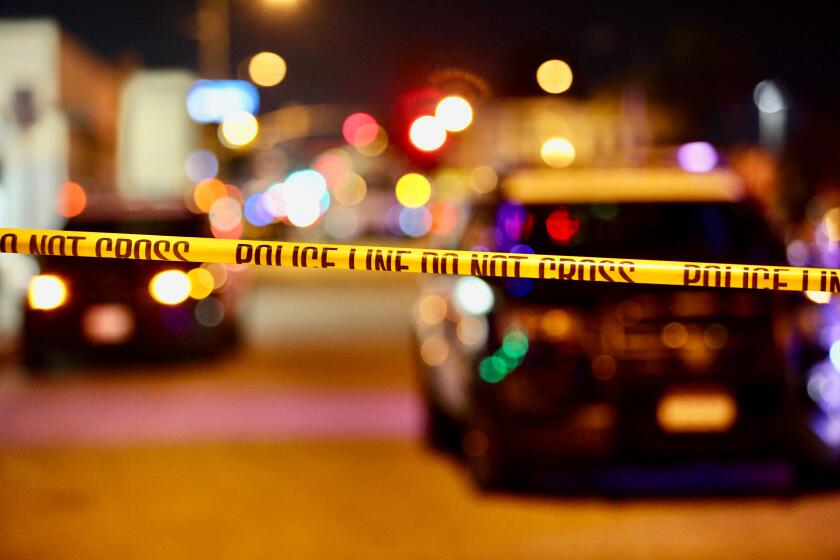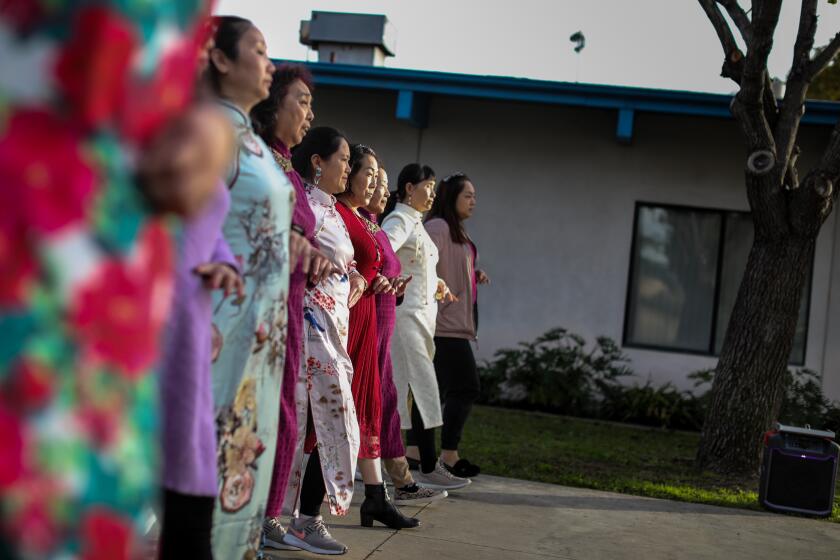You may feel secondary trauma from mass shooting coverage. Therapists discuss ways to cope

The violence is consuming your thoughts. The social media apps you use for a distraction from reality are flooded with accounts and updates about the mass shooting.
You may even start to feel the terror, outrage or despondency as physical sensations.
“Symptoms are your body’s way of communicating that there’s an issue happening,” clinical psychologist Amanda Seon-Walker told The Times last year.
When we read and watch the news after a mass shooting — Buffalo, Laguna Woods and Uvalde last year; and now Monterey Park in 2023 — we can experience what experts call secondary and collective trauma.
Last year, we asked four psychologists about secondary and collective trauma, how it affects us and what we can do to healthily process and cope. Here are their responses.
The COVID-19 pandemic has affected nearly everyone’s mental health. If you’re looking for help, here’s a list of resources
Q. What should people understand about secondary trauma or collective trauma? Who can that affect?
Manuel Zamarripa, clinical psychologist and president of the National Latinx Psychological Assn., and Oscar Fernando Rojas Perez, clinical psychologist and policy advisor for NLPA: People should understand that collective trauma is a psychological reaction/response to a traumatic/terrible event; for example, the events in Uvalde and Buffalo, experienced and shared by a group of people. And [it] can affect an entire community. ... It is also normal for people to feel powerless and experience strong emotions. Collective trauma differs from individual trauma in the sense that collective memory persists beyond the lives of the direct survivor of the events and is remembered by group members that may be far removed from the terrible event in time and space.
It is also important to note that survivors of the event will remember the tragedy differently than those who witnessed the actual event, and the constructions of the events may take different shape and form from individual to individual. Further, when a society or community has a shared membership that is significant to their identity, then this secondary trauma can be especially impactful.
Anjuli Amin, clinical psychologist and president of the Asian American Psychological Assn.: We see this process of secondary trauma (vicarious traumatization) often in first responders, medical professionals and those who are routinely exposed to trauma. Research is showing us, however, that exposure to traumatic events through the media can lead observers to experience anxiety, difficulties in coping, feelings of helplessness and immense fear. In a sense it can affect us all, particularly with how difficult it can be to escape the constant news cycle.
Seon-Walker: Trauma in general has to do with when it overwhelms your ability to address something, your coping skills. With secondary trauma, a lot of people don’t recognize that the things assaulting them from the media are assaulting their own ability to cope. So sometimes people have to get aware of what’s going on for them and what’s going on in their own body, in response to what they’re consuming.
It certainly affects individuals who have more stressful life situations. I would say that’s who really needs to be aware — those who have a predisposition for stress, because that could be the thing that takes people beyond their coping mechanisms. The other people it could really impact [are] people who have a worldview that the world is safe. When [mass shootings happen] back to back to back, it can really shatter a person’s worldview in terms of, “What is my world like?” “Is my world really as safe as it is?” “Am I safe where I am?”
With the deadly January 2023 shooting in Monterey Park creating worry and fear, refresh your knowledge of expert advice about what to do if you are caught in a mass shooting.
Q. When the victims of mass shootings come from your community, race or cultural background, how does this add another layer of trauma?
Amin: When there is a personal connection to an event such as a mass shooting, it can activate our fight-or-flight response so that we feel anxious, hyper-vigilant, fearful. We may begin to respond to our environment as though we are in survival mode. It can also bring up our own experiences of trauma, adding to the response we have in the moment, but also taking us back to our past where we may start to experience emotional distress in response to those memories.
It may also reinforce certain beliefs or views of the world that we have developed based on our life experiences. For example, if I hold a belief that the world is a dangerous place, witnessing something such as a mass shooting may reinforce that.
Zamarripa and Rojas Perez: When the victims of mass shooting are members of a racial and/or ethnic community, it is common for individuals of said community to experience a heightened sense of feeling unsafe in daily life — work, home and community. It can also serve as a reminder of past and other present acts of aggression, violence, violation that may have been experienced by others, and experiences of “isms.” People are also likely to experience poor mental health in the following months. It is also common for people of said community to experience discrimination and be vilified by the media. As a result, people of racial and ethnic communities become more vulnerable to experiences of racial and ethnic trauma.
Q. What are some ways people can healthily process news of recent mass shootings?
Amin: My No. 1 recommendation is to take a break from the news and media. We are not built to take in a constant stream of stress and anxiety; our bodies and minds can’t handle that. We have to find time to disconnect and [do so] on a consistent basis. I always encourage folks to start small — can you turn off the screens, the alerts, the notifications, for just two minutes today? If you can do two minutes today, can we work up to five minutes next week? Being consistent with this also helps us build the habit and turn something into a lifelong practice.
Making sure to process the emotion and thought you’re holding is important. Journaling, talking it out, movement are all ways we can help our bodies digest the stress and avoid a buildup of emotion.
And then, once we’ve processed our emotion we can more easily come to a space of taking action. I recommend folks connect with the things within their reach. We can’t solve the bigger problems of the world, but we can still do things that align us with our values and keep us in touch with the person we want to be. Starting small here is key, especially when we feel overwhelmed by what’s happening. Checking in on a neighbor, buying a coffee for a co-worker, holding the door for someone. These are things that we can easily minimize, but have the potential to go a long way in difficult moments.
Seon-Walker: One is being aware of symptoms, like if you’re having any intrusive symptoms, any flashbacks about what happened, any nightmares, trouble sleeping, if you’re feeling activated, if you’re feeling tingling in your body, or that you’re having a panic or heart attack, any kind of arousal like that needs to be addressed. It’s important to go and find some therapeutic help for symptoms like that, to really find spaces to have support. And that could be a mental health provider, it might be your spiritual provider, it might be a support group.
Zamarripa: Some of us had a hard time getting to work the next day. Sometimes we’re like, “Don’t let it get the best of you. We have to move on. There’s a time and place for that.” But at the same time, these losses are so devastating. ... If we feel incredibly grief-stricken, if we don’t feel like going to work — these are valid feelings. We don’t always have to understand them in the moment. That’s how grief and trauma work.
The Lunar New Year mass shooting in Monterey Park has residents mourning in their tight-knit suburb once dubbed the “Chinese Beverly Hills” as the population changed.
More to Read
Sign up for Essential California
The most important California stories and recommendations in your inbox every morning.
You may occasionally receive promotional content from the Los Angeles Times.














